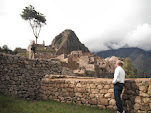Greetings! Last time we considered conversations with religious sages. In the realm of modern religious leadership, two influential figures stand out for their significant impact on society and their adept use of media to disseminate their messages. Elijah Muhammad, the leader of the Nation of Islam, and Billy Graham, the renowned evangelist, both rose to prominence during the 20th century, each with a distinct approach to spreading their respective ideologies. This blog post provides a basic review of the work of Elijah Muhammad and Billy Graham, focusing on their utilization of media platforms to reach their audiences and propagate their beliefs.
Elijah Muhammad, born Elijah Poole, emerged as the leader of
the Nation of Islam (NOI) in 1934. He preached a message of black nationalism,
self-reliance, and empowerment for African Americans, advocating for social,
economic, and spiritual upliftment. Elijah Muhammad utilized various media
channels to disseminate his teachings and expand the influence of the Nation of
Islam.
Mr. Muhammad recognized the power of print media in reaching
a wide audience and disseminating his message. The NOI published newspapers
such as "Muhammad Speaks" and "The Final Call," which
served as platforms for articulating the group's beliefs, addressing social
issues, and recruiting new followers. He authored several books, among them Message
to the Blackman in America, How to Eat to Live, and The Fall of
America. Along with his wife, Clara, Muhammad established schools. Many are
still active today.
Elijah Muhammad also utilized radio and television
broadcasts to communicate with his followers and the broader public. He
appeared on radio shows and purchased airtime for NOI-sponsored programs,
spreading his message beyond traditional boundaries and into the homes of
millions. Muhammad was a charismatic and persuasive orator who captivated
audiences with his powerful speeches. He frequently delivered sermons and
lectures at NOI mosques, public venues, and community events, using his oratory
skills to inspire and mobilize his followers. Elijah Muhammad was the leader
of the largest organization for Black Americans in his time.
Billy Graham, often referred to as "America's
Pastor," was a prominent Christian evangelist who played a pivotal role in
the spread of evangelical Christianity worldwide. He employed a range of media
strategies to evangelize and engage with audiences, becoming one of the most
recognized religious figures of the 20th century.
Billy Graham gained widespread fame through his large-scale
crusades and revival meetings held in stadiums, arenas, and open-air venues
across the globe. These events attracted massive crowds, and Graham's dynamic
preaching style and message of salvation drew millions to his evangelistic
campaigns.
Graham recognized the potential of television as a powerful
medium for reaching mass audiences. He hosted televised crusades, such as the
historic 1957 New York City Crusade, which reached millions of viewers
nationwide. Additionally, Graham's films, documentaries, and television
specials further extended his reach and impact.
Billy Graham authored numerous books, articles, and columns
on Christian theology, spirituality, and contemporary issues. His bestselling
works, including The Jesus Generation and Peace with God, served
as influential resources for Christians seeking spiritual guidance and
inspiration. It has been suggested that Billy Gramham had the most profound
impact on Christian evangelism in the modern era. Unlike any other religious
leader, Graham met with twelve sitting American Presidents.
While Elijah Muhammad and Billy Graham operated within
different religious contexts and espoused divergent theological beliefs, they
shared a common goal of spreading their messages to a broad audience. Both
leaders recognized the transformative power of media in shaping public opinion,
mobilizing followers, and influencing social change, and they used it
effectively.
However, there were notable differences in their approaches
to media utilization. Elijah Muhammad's messaging often focused on issues of
racial injustice, black empowerment, and separatism, which appealed primarily
to African American audiences. In contrast, Billy Graham's evangelical message
emphasized salvation, personal redemption, and the universality of
Christianity, targeting diverse audiences across racial, ethnic, and
socio-economic lines.
While both leaders utilized traditional media platforms such
as print, radio, and television, Graham's embrace of mass media was more
extensive and innovative. His pioneering use of television and large-scale
evangelistic events propelled him to international fame and made him a
household name. Whereas Muhammad’s focus was primarily related to racial
inequality in the United States.
The work of Elijah Muhammad and Billy Graham offers valuable
insights into the role of media in disseminating religious messages and shaping
public discourse. Despite their ideological differences, both leaders
effectively leveraged media platforms to engage with their audiences, promote
their respective worldviews, and leave a lasting impact on society. Their
legacies serve as a testament to the enduring power of faith, persuasion, and
media in shaping the human experience.
All the best,
Tom

